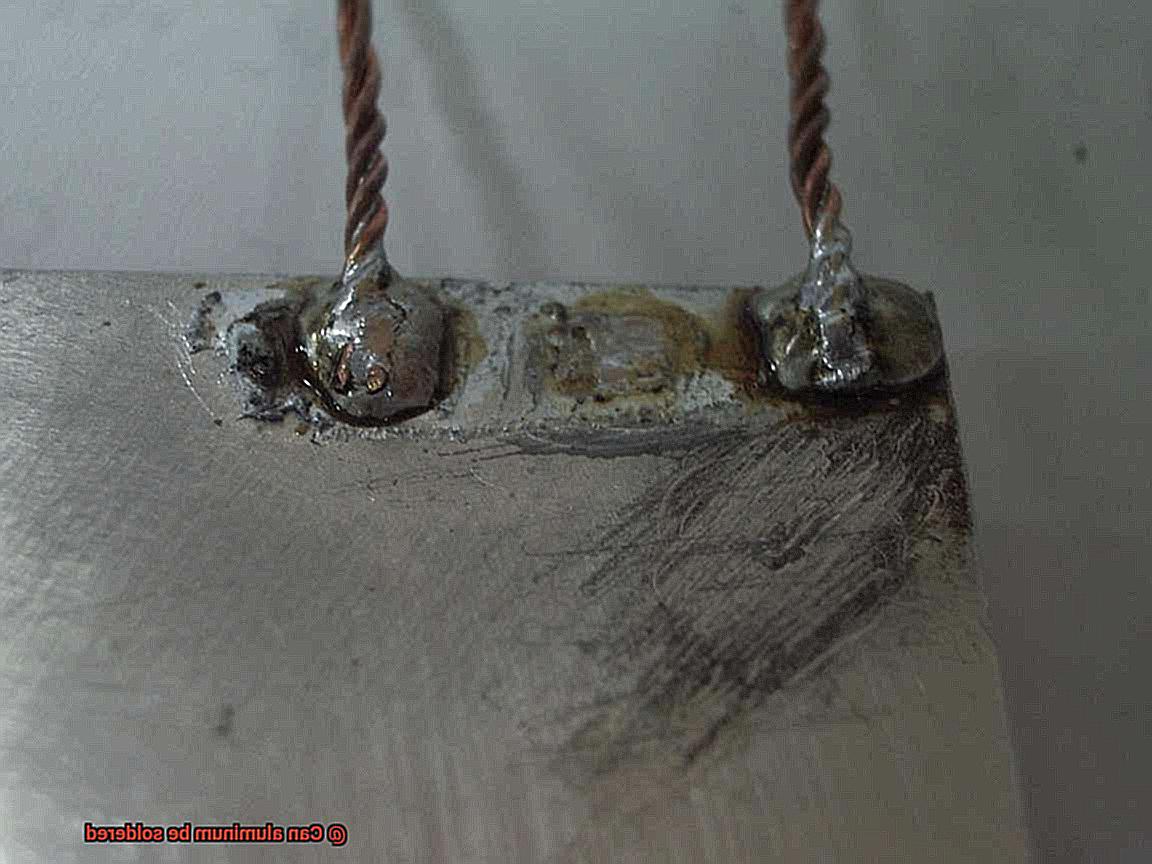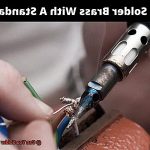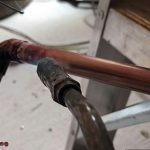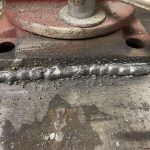Are you finding it challenging to connect pieces of aluminum together?
Whether you’re an engineer or a DIY enthusiast, this can be a tricky situation. But here’s some good news: aluminum can indeed be soldered.
Before we delve into the details, let me share an interesting fact with you. Did you know that aluminum is the most abundant metal on Earth?
Its strength-to-weight ratio, corrosion resistance, and versatility make it a popular choice for various applications ranging from airplanes to soda cans. However, soldering aluminum can be quite challenging due to its low melting point and the oxide layer on its surface.
But don’t lose hope just yet. With the right tools and techniques, you can achieve a strong and durable bond between aluminum pieces.
In this blog post, we’ll explore everything there is to know about soldering aluminum – from the types of solders and fluxes to use to the precautions you need to take. We’ll also discuss the challenges and limitations of soldering aluminum and when it might not be your best option.
So whether you’re a professional or a hobbyist, get ready as we dive into this fascinating topic of “can aluminum be soldered” and uncover all the secrets behind successfully soldering aluminum.
What is Aluminum?
Contents
Aluminum is a chemical element that’s taking the metal world by storm.
With its incredible strength and lightness, it’s like the Usain Bolt of metals – quick on its feet and ready for anything. But what really makes aluminum stand out from the crowd is its exceptional resistance to corrosion.
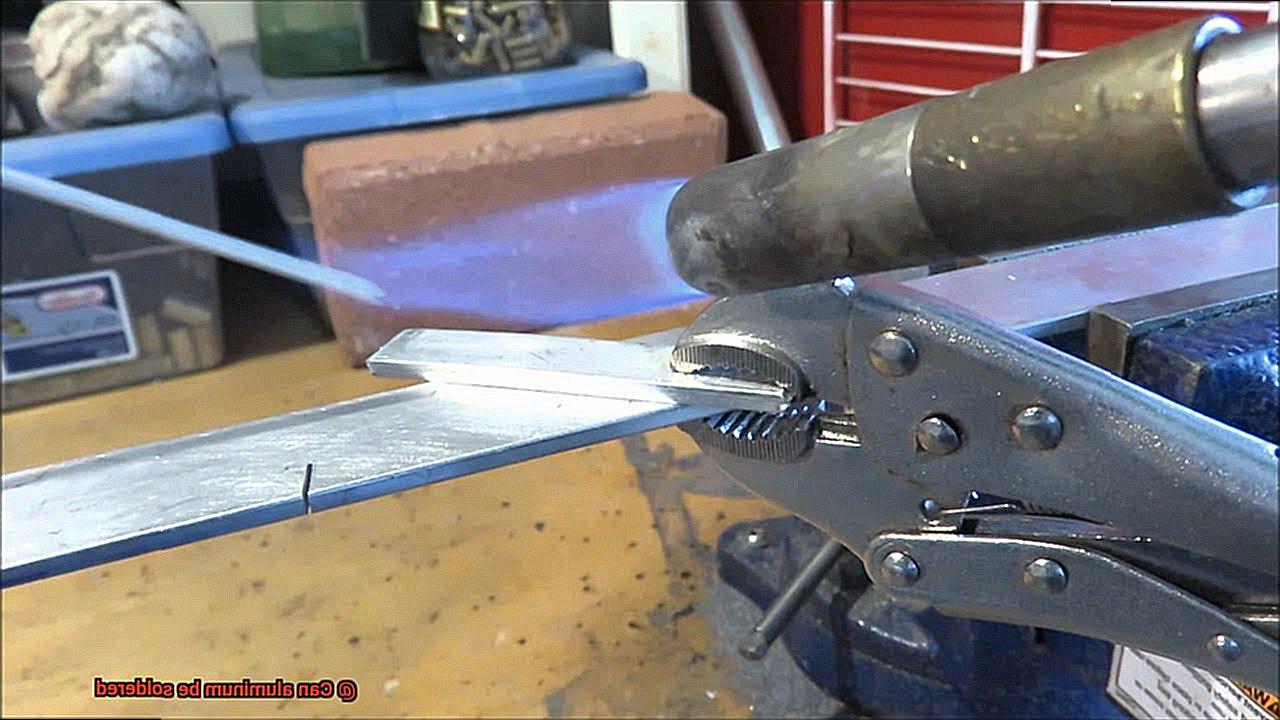
It’s like it has a magical shield that keeps rust and other forms of corrosion at bay. The secret to aluminum’s superpower lies in the thin oxide layer that forms on its surface when it’s exposed to air.
This layer not only protects aluminum from corrosion but also gives it a reflective, shiny luster that makes it perfect for mirrors and reflectors. It’s like having a stylish suit of armor that makes you look good.
But wait, there’s more. Aluminum also boasts excellent thermal and electrical conductivity properties.
It’s like having a master messenger that can easily transfer heat or electricity from one place to another, making it ideal for use in heat sinks and electrical wiring. Now, you might be wondering about soldering aluminum.
It sounds like a tough nut to crack due to its high thermal conductivity and pesky oxide layer that can make soldering difficult. But fear not – there are specialized techniques and equipment, such as flux and temperature-controlled soldering irons, that make soldering aluminum possible.
Flux helps remove the oxide layer from the surface, allowing the solder to adhere to the metal. And with a temperature-controlled soldering iron with a high-temperature tip, the solder melts and bonds with the aluminum seamlessly.
It’s like having a secret agent who knows how to get past barriers and make connections. In conclusion, aluminum is an MVP in many industries thanks to its unique properties.
And with specialized techniques and equipment available, even soldering aluminum is possible.
Challenges of Soldering Aluminum
Aluminum may be the hero of the metal world with its resistance to corrosion and sleek appearance, but when it comes to soldering, it can be a tough nut to crack.
One of the biggest hurdles you’ll face when soldering aluminum is its high thermal conductivity. This means that it heats up quickly and dissipates heat rapidly, making it challenging to maintain the required temperature for soldering.
Poor adhesion and weak joints can result if you’re not careful. Another obstacle is the thin oxide layer that forms on the surface of aluminum, which can inhibit the adhesion of the solder.
Removing this layer can be a difficult task, especially when dealing with complex shapes or bulk soldering. Additionally, aluminum has a low melting point compared to other commonly soldered metals like copper or brass, which can lead to joint failure if not handled correctly.
But rest assured, there are techniques and tools you can use to overcome these challenges. Preheating your aluminum before applying solder can help reduce the temperature differential between the two materials and promote better adhesion.
Specialized fluxes formulated for aluminum can also help remove the oxide layer and promote adhesion. Using specialized solders containing higher levels of zinc or copper will create stronger joints, and using a suitable soldering iron or torch with adjustable temperature controls will ensure that the proper temperature is maintained throughout the soldering process.
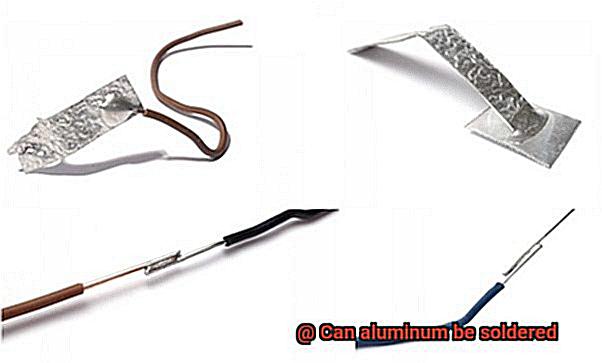
These tools will reduce the risk of joint failure and ensure successful results. In conclusion, while soldering aluminum may present some challenges, with the right techniques and tools, you can create strong and reliable joints in this material.

The Use of Flux for Soldering Aluminum
Soldering aluminum is like walking a tightrope, but with the help of flux, you can balance like a pro.
Flux is the Robin to your soldering Batman – it’s a chemical agent that helps remove any oxidation present on the surface of the aluminum. Aluminum’s love for oxygen can cause it to form a stubborn layer of aluminum oxide that resists soldering.
But fear not. Flux comes to the rescue by acting as a cleaning agent that removes this annoying layer and paves the way for successful bonding between the solder and aluminum.
Choosing the right type of flux is key to achieving perfect soldering results. You have two choices: rosin-based and acid-based fluxes.
Rosin-based fluxes are non-corrosive and leave behind a residue that is non-conductive, making them ideal for electrical soldering applications. However, they may not be suitable for heavily oxidized aluminum surfaces.
If you’re dealing with a tricky aluminum surface that has heavy oxidation, acid-based fluxes are your go-to. They pack a powerful punch and contain hydrochloric or phosphoric acid, which reacts with the oxide layer on aluminum and removes it.
But beware – acid-based fluxes are highly corrosive and can damage the aluminum if not cleaned properly after soldering. In conclusion, using flux is like having a trusty sidekick in your soldering journey.
Remember to choose the right type of flux based on the type of aluminum surface being soldered and to clean the surface thoroughly after soldering to prevent any damage caused by residual flux.
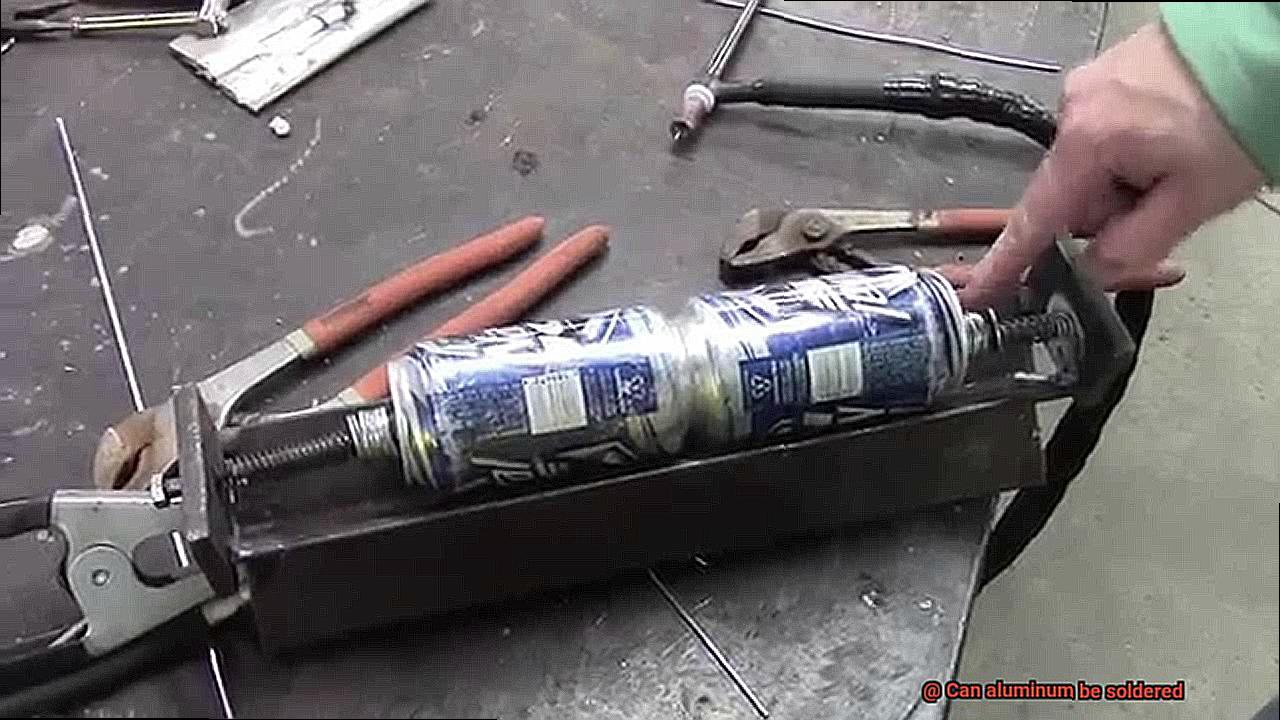
Temperature-Controlled Soldering Irons for Soldering Aluminum
Soldering aluminum can be a real challenge, but with the right tools and techniques, you can make it a breeze.
One of the most critical tools in your soldering kit for aluminum is a temperature-controlled soldering iron. Think of it like cooking a delicate dish – you need to have precise control over the temperature to ensure that everything comes out just right.
Aluminum has a high melting point, which means that if you expose it to too much heat, it can become damaged or even crack. That’s where using a temperature-controlled soldering iron comes in handy.
A temperature-controlled soldering iron is like having a sous chef in the kitchen who helps you monitor the heat of the stove so that you don’t burn your meal. It allows you to adjust the temperature of the tip based on the specific needs of the aluminum being soldered.
This ensures that you’re not overheating the aluminum, which can cause it to warp or crack. When selecting an iron for soldering aluminum, it’s important to consider the wattage of the iron.
A higher wattage iron will heat up faster and maintain its temperature more consistently, making it easier to work with. It’s like choosing a high-quality knife for your cooking – it may cost more, but it will make your work easier and more precise.
The size and shape of the tip also play a significant role in achieving successful solder joints. For soldering aluminum, it’s best to use a chisel-shaped tip that provides more surface area for heat transfer.
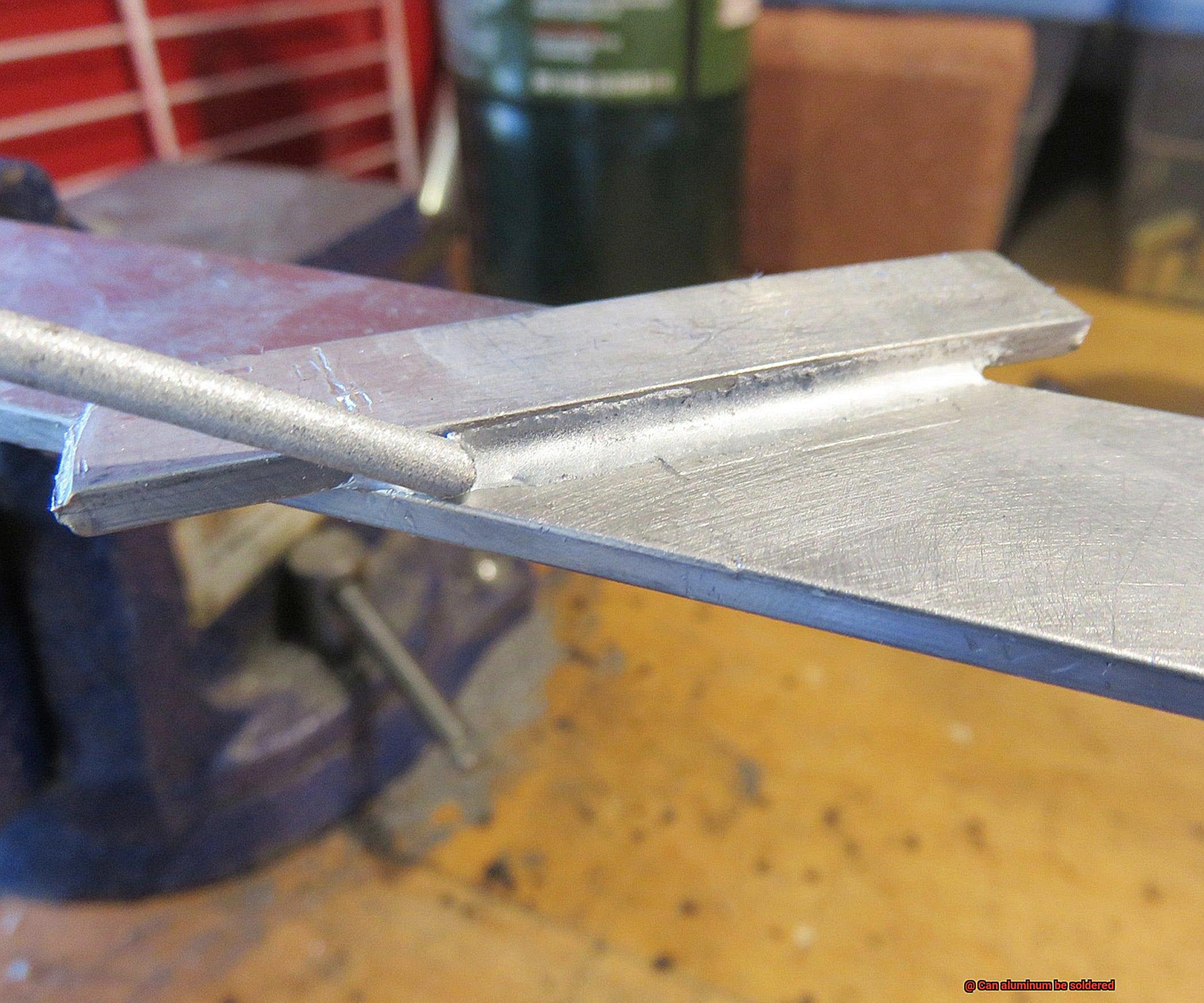
The tip should also be made from a high-quality material such as copper or brass, which conducts heat well and resists corrosion. Overall, if you want to achieve strong and reliable solder joints when working with aluminum, a temperature-controlled soldering iron is an essential tool in your arsenal.
Other Specialized Equipment for Soldering Aluminum
Soldering aluminum requires a bit of finesse, but with the right equipment, you can make it a breeze.
Of course, it’s common knowledge that a temperature-controlled soldering iron is key to getting the job done right, but did you know that there are other specialized tools that can take your aluminum soldering game to the next level? For those larger projects or thicker pieces of aluminum, a propane torch can be used to heat up the metal quickly.
However, it’s important to note that using a propane torch requires skill and experience as the heat generated by the torch can easily damage the surrounding areas if not properly controlled. Another option for soldering aluminum is using a resistance soldering system.
This unique system uses high-frequency current to heat up the joint area, providing precise control over the heat and ensuring a strong bond between the aluminum and solder. This method is particularly useful for intricate or delicate work where precision is key.
When working with aluminum, it’s also essential to use flux specifically designed for this metal. This helps remove any oxidation on the surface of the aluminum and allows for better adhesion of the solder.
It’s also recommended to use a wire brush or sandpaper to clean the surface of the aluminum before applying flux and solder. While specialized equipment may not be necessary for all aluminum soldering projects, they can certainly make the process easier and more efficient.
bFf3zO2Ys64″ >
Conclusion
In conclusion, the answer to the question “can aluminum be soldered?”
The answer is a resounding yes. Despite its low melting point and pesky oxide layer, aluminum can be soldered with ease using specialized tools and techniques.
Aluminum’s unique properties make it a popular choice for various applications due to its resistance to corrosion and excellent thermal and electrical conductivity. However, these same properties can also make it challenging to solder.
Thankfully, specialized fluxes and solders formulated for aluminum can help remove the oxide layer and promote adhesion. Temperature-controlled soldering irons with high-temperature tips are essential for maintaining the proper temperature during soldering.
For larger or more intricate projects, propane torches or resistance soldering systems can also be used. Choosing the right type of flux based on the type of aluminum being soldered is crucial to achieving successful results.
